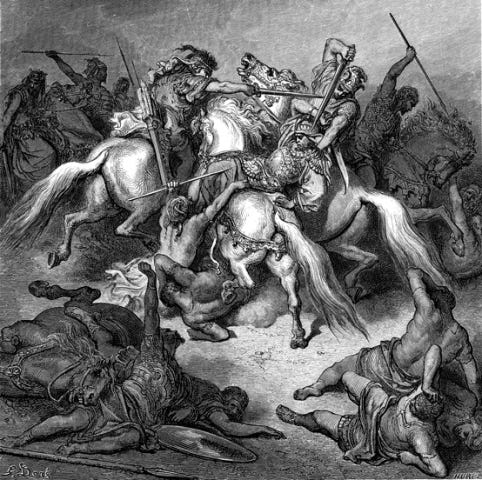This is War!
It’s never the right time to discuss it. Because there’s nothing pleasant about it. But we can’t afford to avoid it.
[Click title to view in browser.]
Friends, we’re at war.
We’ve been at war for millennia, true, but now the enemy has taken the time to properly encircle us and employ all available diplomatic and communications-oriented subterfuge in an attempt to ‘finish the job’.
He has armies, police, politicians, business and religious leaders, academics and the entire professional scribbling class on side – and they’re poised to march.
So, a few questions…
Just what kind of time-frame are we looking at before we face a full frontal assault?
And who exactly is the ‘we’ in this war equation?
And perhaps even more important: how do we prepare?
Hang tight, Geronimo, because you may be shocked by the answers.
HOW LONG?
To begin, let’s examine the first question, the time frame.
Step back with me into the TaNaCH.
The Book of Daniel (12:11) prophesies as follows –
: וּמֵעֵת הוּסַר הַתָּמִיד, וְלָתֵת שִׁקּוּץ שֹׁמֵם--יָמִים, אֶלֶף מָאתַיִם וְתִשְׁעִים
: אַשְׁרֵי הַמְחַכֶּה, וְיַגִּיעַ: לְיָמִים--אֶלֶף, שְׁלֹשׁ מֵאוֹת שְׁלֹשִׁים וַחֲמִשָּׁה
11. And from the time that the continual burnt-offering shall be taken away, and the detestable thing that causes appallment set up, there shall be a thousand two hundred and ninety [1290] days.
12. Happy is he that waiteth, and cometh to the thousand three hundred and five and thirty [1335] days.
The “detestable thing that causes appallment” in pasuk 11 is none other than the Dome of the Rock – the horrid Mosque of Omar – which was constructed to humiliate the Jews and render Yishmael YM”Sh as inheritor of the Even haSh’tiyah and Har HaBayit.
The “days” referred to in the psukim are actually years, as is often the case in Tanach.
So…
While there’s disagreement over the precise date of the completion of the ‘appallment’ – some claiming it to be as early as 689 CE and others figuring as late as 692 CE – an inscription in the Dome of the Rock itself establishes the date of its completion as 691–692.
And…?
If you add the 1290 years referred to in Daniel to 691-692 you’re brought directly to 1981-1982, precisely the years that the State of Israel, under the leadership of the faint-hearted Menachem Begin, signed a “Peace Agreement” with Egypt that rendered to that lowly nation the entire Sinai Peninsula and all its thriving communities, creating the greatest chillul Hashem of the third Jewish Commonwealth.
It should be stated clearly, however, that this chillul Hashem was perpetrated exclusively by Jews – or, rather, by the Erev Rav leaders of the Jewish State – before the eyes of the entire world, after two wars (1967 and 1973) in which the Holy One Blessed Be He granted His people miraculous victories to secure that same territory.
Let it be further noted that these were victories that were thrown away – from faint-heartedness and lack of true belief – in a brazen-faced rejection of the Al-mighty G-d of Abraham, Isaac and Jacob, not to mention a spit in the face to all those brave Jews who gave their lives to reconquer this holy Jewish territory.
It’s no surprise, therefore, that these years also correspond precisely to the psukim from Sefer Devarim that state –
I will abandon them and hide My face from them…” (Devarim 31:17)
How’s that?
Here, we take another detour.
A Kabbalistic Counting of Years
The kabbalists have a way of ‘counting the world,’ so to speak, in which each pasuk of the Torah represents a single year.
(For an outstanding explanation of how exactly this works, we recommend you visit Alan B. Harvard’s Climbing the Wall of Redemption blog. Alan is a close friend and associate whose writings on markets and their connection to the End of Days are must-read material.)
Accordingly, ‘In the beginning…’, the first verse of the Torah, corresponds to year number one, the second verse to year number two, and so on.
As it turns out, the two years in question, 1981-1982, correspond precisely to Devarim 31:17-18, from parashat Haazinu, which read as follows –
17. And My fury will rage against them on that day, and I will abandon them and hide My face from them, and they will be consumed, and many evils and troubles will befall them, and they will say on that day, 'Is it not because our God is no longer in my midst, that these evils have befallen me?'
18. And I will hide My face on that day, because of all the evil they have committed, when they turned to other deities.
Again, these two psukim are where we arrive after we add Daniel’s 1290 years to “the detestable thing that causes appallment” of the years 691-692.
In other words, Hashem’s fury – His Haster Panim – at our bargaining away a part of Eretz Yisrael to the Yishmaelites will continue to burn – according to Daniel’s prophecy – for a full 45 years, after which point, Daniel proclaims, “Happy is he that waiteth, and cometh to the thousand three hundred and five and thirty days.”
If you add 45 years to 1981-1982, you arrive precisely at 2026-2027, just a short stop away from today.
Those who make it to the “other side” – to 2026-2027 (may we all merit it) – will be counted, according to Daniel, among the ‘happy’.
40 Years – The Prophetic Role of Rabbi Meir Kahane
In 1982, Shortly after the evacuation of Sinai, Rabbi Kahane, ZTZ”L, HY”D, published his book Forty Years (second edition in 1989), in which he masterfully canvassed all the written and oral Torah to convey the importance of the number 40 in Jewish history – and most critically, how the Al-mighty often blocks out time in four decade installments, waiting, warning, hoping, as it were, that we might return to Him and either avoid His wrath, or put an end to the punishments He’s already meted out upon us.
Rav Kahane’s book explains that in Torah these 40 years are not always fixed rigidly; sometimes it’s a little more or a little less – but the essence of the idea is fixed. We are given notice that once we stray, the hourglass is flipped, and the sands begin to fall.
The forty year clock begins ticking.
Rabbi Kahane’s book, published directly after the crimes of Yamit, in which a massive expanse of our Holy Land was fecklessly given to a debauched am ar’el, was just such a notice.
Forty years from the publication of the book, from the unpardonable crimes of the Begin government, brings us to the year 2022.
Forty years from the day Hashem told us he would HIDE HIS FACE from us for bartering our patrimony.
To 2022.
Daniel’s dire warning of forty five years aligns almost perfectly with Rabbi Kahane’s (2026-2027).
Either way, good Jews and Noahides, know it well – we’re in the midst of it.
The forty years of grace, of waiting for our return, of hoping that we might show genuine faith in our Father, our King, the Master of Heaven and Earth, and act to build Him a home to dwell amongst us… those forty years are coming to a swift end.
The finale is here.
And time is almost up.
And that’s why the war is about to gather momentum.
A great change is on the way – but a year from now according to Rav Kahane’s count (at the earliest).
And a mere five to six according to Sefer Daniel.
Perhaps one marks a beginning, and the other an end?
Hard to say.
Calculating the END
Take heart, good souls.
For it’s not for nothing that the year 2028/2029 (5789) in the Hebrew Calendar comes out as the year תשפ"ט – the year of judgement: for תשפ"ט means –“You will judge”.
And the pasuk from the Torah that aligns with תשפ"ט (2029) – the 5789th pasuk of our holy Torah – reads as follows (Devarim 32:36) –
36. When the Lord will judge His people, and will reconsider His servants, when He sees their helplessness, and none is saved or assisted…
The judgment of the Al-mighty (תשפ"ט) arrives “When the Lord will judge His people…”, the pasuk that aligns with the year 2028/2029.
Happy will be they who are still among us.
For Rashi explains on this pasuk that it denotes a change of heart, so to speak, on Hashem’s part, in which He will have mercy on His servants:
:כשיבואו עליהם משפטים הללו ויתנחם הקב"ה על עבדיו לשוב ולרחם עליהם
When these judgments will come upon them, the Holy One, Blessed be He, will reconsider concerning His servants to return [to them] and to have mercy upon them.
In the year of judgment — תשפ"ט.
The time is approaching.
And there’s still a great deal to be said on the matter.
But that should suffice for now.
May the evil ones’ judgment be bitter.
Dean Maughvet







Clive.
Your comments have been deleted for not following site policy.
The man's name was Yoshki.
Please refer to him as such in all future correspondence.
Lst we be forced to kill him again.
Clive: May the evil ones’ judgment be bitter.